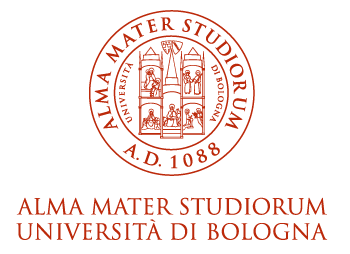co-founder and COO of LUPA and Fundraising expert in start-up sector
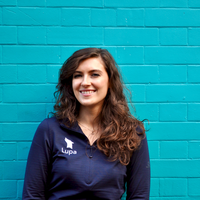
Eleonora Mantovani, originally from Bologna, received her master's degree in International Management at Alma Mater Studiorum - University of Bologna in 2016. Endowed with an unstoppable determination, she now lives in London.
After having founded Lupa, a start-up dedicated to supporting people in their physical and mental wellbeing, she returned to operate in the Venture Capital sector. Today, she supports early-stage startups in their fundraising efforts, connecting them to venture capital investors to raise their rounds.
In general, my interest had always been to work abroad. In fact, the aspect that I most valued in choosing IM is that of internationality.
An environment in which to speak in English and have the possibility of relating with people of other nationalities was an essential criterion for me. Luckily, on the day of the course presentation, I noticed that the other classmates came from several different backgrounds and countries.
Furthermore, the classes were much less numerous than those experienced in the previous three years, an aspect that I personally liked very much. It allowed me to establish a personal and human relationship with the professors and forge profound and essential friendships.
Finally, right from the start, I was struck by the practical approach, which I found highly effective. I wasn't interested in spending hours in the library and studying from textbooks. I have always been the type of person who learns by doing, and precisely this approach is also reflected in the educational offer of IM.
The program's vocation has always been to unite students with different backgrounds and create an ecosystem to maximize exchange and contamination. Although the students in my class came from very heterogeneous study areas, this was not an obstacle to learning, thanks to the program's well-balanced structure.
Therefore, I think that the secret to tackling the IM in the best possible way is motivation, curiosity, and resourcefulness, rather than the theoretical foundations acquired over the bachelor's degree.
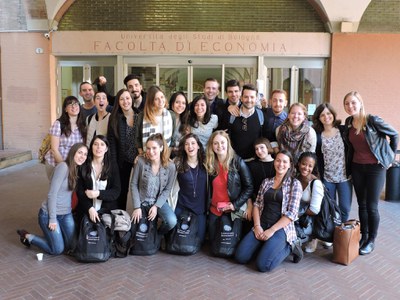
Working in a group was certainly an immense added value, which helped me a lot later in my career path.
This way of working requires mainly an investment of time: you have to align yourself with other people's needs and divide up tasks and responsibilities. When you are a student, the number of hours in the classroom is substantial (attendance at courses is mandatory, ed.). So after five hours of class, you happen to have to deal with group work right away until late in the evening.
However, teamwork allows you to experience the working atmosphere in advance. There are times, of course, when working in a group is more straightforward than others because you are surrounded by people like you. Other times, you have to put in a little more effort because not everyone has the same goals and interests. But this is the strength of IM: it prepares you for the world of work since, in real life, you don't always find people who perfectly fit your personality and approach.
The IM is not just a course in which you learn notions, but it is above all a training experience that provides you with the tools for a focused approach to the world. It gives you open-mindedness, teaches you flexibility, management of interpersonal relationships, and the ability to manage time.
Indeed, the most exciting activities are the projects with which companies directly involve students in solving real problems.
The IM takes advantage of Bologna's strategic position and the industrial district in which the city is immersed, proposing many project works with the leading companies in the area. The IM business network offers the unique opportunity to work closely with world-class excellence in research, development, and technological production.
The projects work in this way: the company assigns tasks on concrete business problems, and each team is called upon to propose effective solutions.
It is a fantastic way of learning: it makes you feel responsible for your work because you perceive how your contribution has a broader purpose than the mere final grade.
The fact that managers and employees take the time to listen to what you have to say and potentially benefit from it has been gratifying and inspired me to do my best.
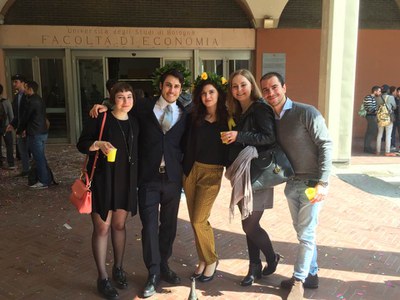
When I started the IM, I thought I had clear ideas about my future, but I discovered that my real interests were others thanks to the program.
The choice of the thesis was certainly decisive in maturing this understanding. Involving the Italian Institute of Technology in Genoa, Cambridge, and Epfl in Switzerland, I could observe ecosystems for innovation and understand how research translates into start-ups and the commercialization of new technologies.
I wrote the thesis with another student in my course. Thanks to our supervisors, it has been a unique experience: we spent two weeks in each of these ecosystems, talking with researchers, entrepreneurs and professionals who worked there, meeting interesting people, and making valuable contacts for the future.
In this sense, the human relationship established with professors and my thesis supervisors, including Professor Ferriani (didactic director of IM, ed), was fundamental. It was precisely Professor Ferriani who, after graduation, mindful of how much I liked the thesis, pointed me to an internship offer in London at a venture capital firm and accelerator. I applied, they offered me a very challenging position, and I immediately moved to London, where I probably spent the best two working years of my life.
In general, the relationship of encouragement and continuous support established between students and professors is something I have never seen in other courses. There is excellent attention to the student and a genuine interest in ensuring that everyone can realize and express themselves in the best possible way.
Almost everything about where I am now, I owe it to IM.
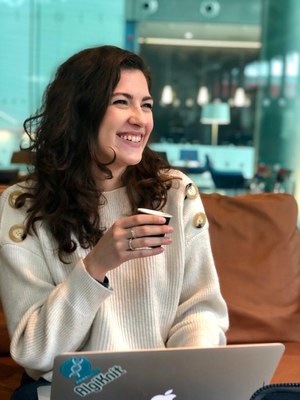
I believe that Bologna is the archetype of the perfect place to experience the university at 360 degrees. It is on a human scale and, despite being a Metropolitan City and regional capital, everything is located in a relatively limited area.
Bologna is located in a strategic geographical position for many factors: the presence of a highly developed entrepreneurial ecosystem, infrastructures that favor international connections, the strengthening of the university and research centers, the tourism development that has increased the notoriety of Bologna in the world.
All of these factors concurred to allow IM to forge numerous corporate partnerships in different sectors. It is the perfect city for those looking for stimulating, international and avant-garde environments in which to build their career.
There are also many university students present in the city, with a high percentage of foreigners. This characteristic determines a great variety from the point of view of open-mindedness and swarming of brains. I find it fantastic.
I would say to choose the IM if you have 100% intention to participate, face all the incredible challenges presented to you, and take advantage of all the possibilities offered. Join the IM if you are ready to ‘battle’ and ask for more for yourself.
It is an educational experience that offers much more than the mere achievement of a degree. It opens up many avenues, facilitates the construction of beneficial networks for your future career, and helps you choose a path.
